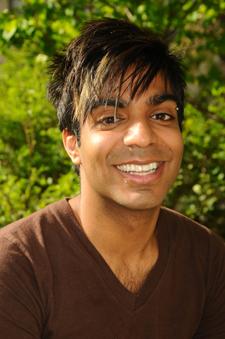A support and social group for South Asian gay, bisexual and trans men is back up and running again after a long hiatus. Dosti, which means “friendship” in Hindi, was only minimally functional for the past several years.
The first meeting of the revived group, held Apr 29 at the 519 Community Centre, drew about a dozen participants.
“They really let it all out and they talked about some of the struggles they faced with coming out to their families and, to me, that was just amazing,” says Dosti coordinator Rahim Thawer, who is also the MSM outreach coordinator with the Alliance for South Asian AIDS Prevention (ASAAP).
Thawer, who was hired on as Dosti’s coordinator in January, says there is still a need for the support group because queers continue to be an “invisible entity” within Toronto’s South Asian communities.
“[At the meeting] some talked about how difficult it was for some people, and for others, how easy it was,” he says. “Some families would say, ‘Okay, we still love you, but don’t tell anyone else about this.’ It can be difficult coming out to parents, especially in close-knit communities.
“I think that the climate is still very difficult and there’s still a lot of repression. A lot of people will be queer with their friends, but not with their family.”
Dosti, an offshoot of ASAAP, was originally created in the mid-’90s. At its peak had more than 100 members in its database. But over time staff changes, service disruptions and a declining attendance took its toll on the group.
“There weren’t people to run it,” says Thawer. “The person who was running it at the time changed positions and left, and it was difficult to get anyone who could commit to running the group on a consistent basis.
“I think people have tried to bring it back here and there, but the consistency wasn’t there. The group kind of fizzled out after a while.”
Although the plans for Dosti are still in the works Thawer hopes to host monthly meetings at the 519 Community Centre with the possibility of increasing to bimonthly gatherings once the group is back on its feet. There are also plans for social events at local bars and restaurants. Details will be posted to the sexy new site Dosti.ca and on the group’s Facebook page. (Dosti.ca itself was recently relaunched and includes a cruisey messageboard, live chat function and sex advice column.)
Thawer says today’s queer South Asians are more political than in the past and that he wants to see their activism reflected in the reinvigorated group.
“I wanted to engage them in that sense and engage them in identity politics, because that’s a big deal,” says Thawer. “So I had a list of topics such as what does it mean to be South Asian? What does it mean to be queer? What is it like to be identified as bisexual and be a minority within a minority? I want to get people to talk about this stuff here, as there’s not too many other safe places to do that.”
Thawer says groups like Dosti can also help prevent the spread the HIV.
“Giving queer people a safe and positive space is often seen as being part of the broader picture, because we feel that communities that are marginalized are the ones that are more at risk. Low self-esteem, shame and a lack of adequate resources can all lead to increase in levels of HIV.”

 Why you can trust Xtra
Why you can trust Xtra


